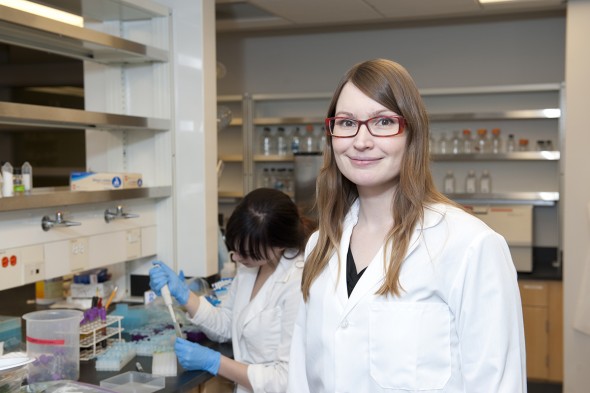Krista Varady weighs in on how to drop pounds

Krista Varady studies alternate-day fasting, when dieters eat only lunch one day and whatever they want the next. Photo: Roberta Dupuis-Devlin/UIC Photo Services
Here’s a good way to lose weight. Fast.
Fast, the verb, as in: not eating very much. In this case, lunch only — skipping breakfast and dinner — every other day.
It’s known as alternate-day fasting, and Krista Varady, assistant professor of kinesiology and nutrition, is the person to ask.
Varady does extensive research on fasting for weight loss. After her work was the subject of a BBC documentary last summer, “five different journalists were contacting me every week,” she said.
What’s so good about alternate-day fasting?
“When people want to lose weight, the most common way is daily calorie restriction,” Varady said.
“You reduce calories by about 25 percent. That works for a little while,” she said.
“The problem is that you probably can’t stick to it more than two months. You’re hungry and uncomfortable throughout the day.”
Fasting every other day works better, she said.
“You have a day in between where you can feel totally normal again,” Varady said.
With alternate-day fasting, dieters have a fast day followed by a feed day. They consume a good-sized lunch — 400 to 500 calories for women and 500 to 600 calories for men — between noon and 2 p.m. on the fast day.
“Then on feed day, they eat whatever they want,” Varady said.
She had assumed dieters would make up for what they didn’t eat on fast day by pigging out on feed day.
“But people eat only about 110 percent of their energy needs on feed day,” she said. “They don’t binge, and they end up losing weight.”
Her research shows that alternate-day fasting dieters can shed 10 to 30 pounds in about eight weeks.
It’s not for everyone. Her study had a 10 percent dropout rate in the first 10 days.
But the rest ended up not feeling hungry on fast days.
“Your body gets used to it,” Varady said.
She’s done or is doing seven studies of alternate-day fasting, the first one begun five years ago.
Currently she’s conducting a yearlong study, funded by the National Institutes of Health, which puts subjects on alternate-day fasting for the first six months and on a higher-calorie regimen the rest of the year.
“We’re checking out whether people can stick to it,” Varady said. “The second six months examines how ADF can be used for weight maintenance.”
Alternate-day fasting has other benefits in addition to weight loss. One study showed that after eight weeks, LDL cholesterol can be lowered 10 to 25 percent. Blood pressure and heart may drop 10 percent.
Another study looked at two alternate-day fasting groups, one satisfying 45 percent of their energy needs with fat, the other 25 percent.
The results were surprising. “After eight weeks, the high-fat group lost 17 pounds, the low-fat group 12 to 13,” Varady said.
“The high-fat group cheated less because they were happier with what they had to eat.”
Another study combined alternate-day fasting with exercise and found a further decrease in LDL cholesterol levels.
“Can you exercise on your fast day?” Varady asked.
“Yes, but it’s better to do it in the morning. You get a hunger surge 30 minutes after exercise, and if people exercise in the afternoon they’re going to cheat.”
Varady grew up in Guelph, Ontario, and earned her bachelor’s degree at the University of Guelph. She moved to Montreal for her Ph.D. at McGill University. Post-doctoral work was at the University of California, Berkeley.
She joined UIC in 2000. “So far, so great,” she said.
“Everyone is really supportive and nice. They’re really into mentorship by senior faculty.
“It’s made it easier to succeed. NIH funding is not easy to get — a lot of people looked at my grant and offered feedback.”
Varady lives in Logan Square with her husband, Nicolas Cote, a French-Canadian she met in Montreal. Cote is pursuing a master’s degree in graphic design at UIC. They have a 2-year-old son, Gabriel.
Varady enjoys drawing, painting and reading.
“I learned stuff about Chicago when I first moved here by reading books like Upton Sinclair’s The Jungle and Erik Larson’s The Devil in the White City.
“Right now I’m reading The Grapes of Wrath.”
Grapes — not a bad way to break a fast.
